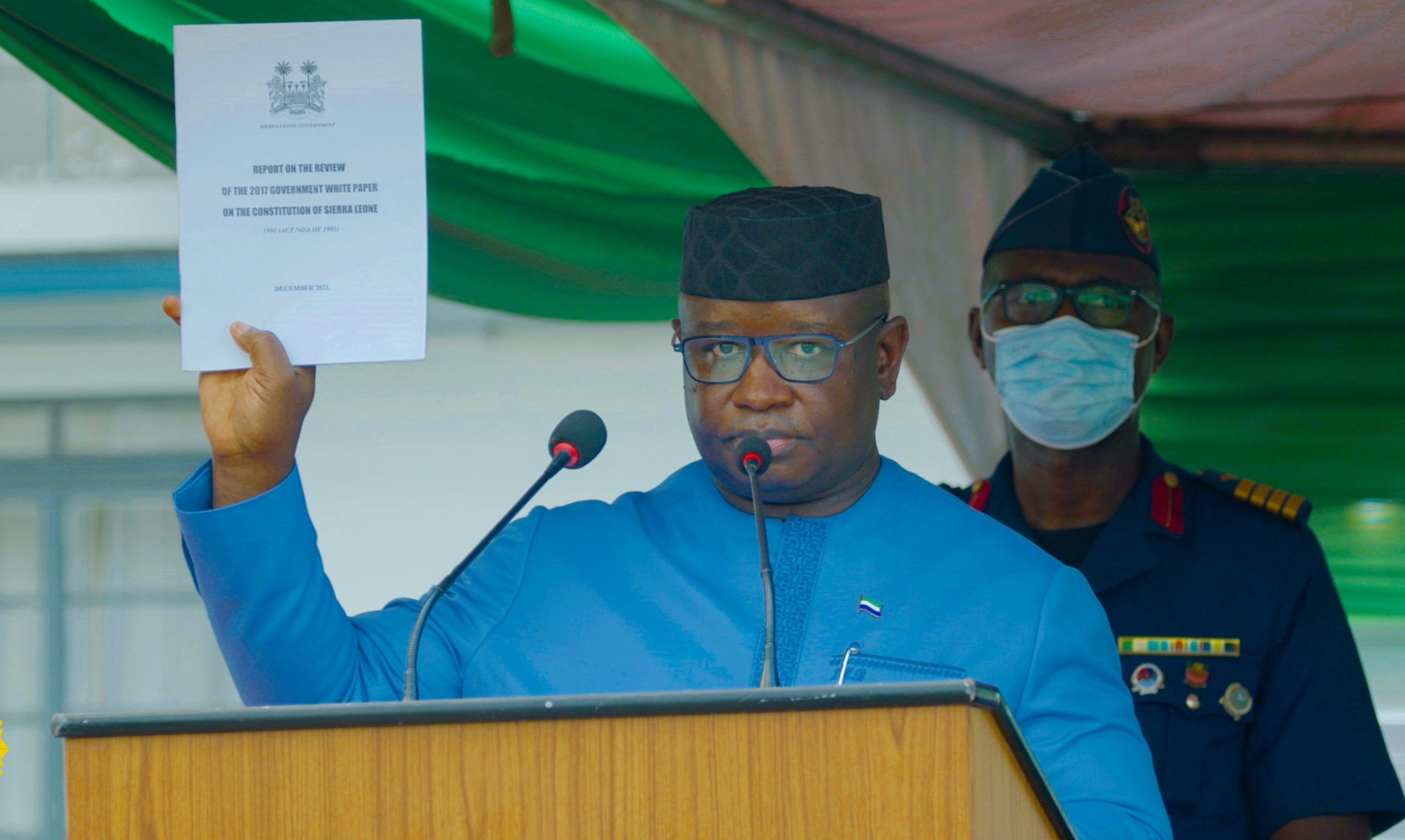STATEMENT BY HIS EXCELLENCY, DR. JULIUS MAADA BIO, PRESIDENT OF THE REPUBLIC OF SIERRA LEONE, ON THE REPORT ON THE REVIEW OF THE 2017 GOVERNMENT WHITE PAPER ON THE CONSTITUTION OF SIERRA LEONE, 1991 (ACT NO.6 OF 1991), FREETOWN, STATE HOUSE
The Honourable Vice President,
The Honourable Speaker of Parliament,
My Lord, the Chief Justice, Superior Court of Judicature,
Ministers of Government,
Honourable Members of Parliament,
Members of the Diplomatic and Consular Corps,
Fellow citizens,
Distinguished Ladies and Gentlemen,
Good morning,
When I promised a new direction for our nation, I did so after much thought and reflection on how we could get it right again as a nation. The anger and brutality of the ten-year civil war and the copious Truth and Reconciliation Report of 2003 were inflection points for our nation. We tasted the bitterness of war; we had not seemed to learn the lessons.
Rather than shy away from the hard-hitting recommendations of the Truth and Reconciliation Commission as my predecessor did, I have actively implemented them because I believe that those governance reforms are in the best interests of this nation.
So, in just the last one year and some months, I have worked with Parliament, the Judiciary, development partners, and civil society organisations to implement over half of dozen of the key governance and legislative imperatives outlined in the Truth and Reconciliation Report.
My Government has repealed Part V of the Public Order Act; there is no journalist in prison for the practice of journalism; the Sierra Leone Association of Journalists and international media and free speech organisations have been consistent that free speech and the practice of journalism are indeed unfettered.
My Government has established the Independent Commission for Peace and National Cohesion to identify and resolve potential triggers of conflict in our nation. According to the Global Peace Index, we are the fourth most peaceful country in Africa. To further cement our credentials as a tolerant nation, Sierra Leone will soon be the latest member of the International Religious Freedom or Belief Alliance – a global alliance that “promotes universal respect for freedom of religion or belief.”
My Government has permanently abolished the brutal and inhumane death penalty for all crimes. Never again; never again will we execute our own brothers and sisters in this nation.
We have deepened and speeded up the process of decentralisation.
We have decongested prisons, improved prison conditions, and significantly expanded access to justice. We will continue doing more.
We have established a standalone Ministry of Gender and Children’s Affairs and introduced policies and laws to protect and promote the rights of children and women. A Gender empowerment and equality law has been laid in parliament and we are reviewing the child rights act.
Social safety, persons with disability, mental health care, improving healthcare, and free quality education for our children have all been at the centre of our agenda to invest in an inclusive and sustainable future for this nation.
Add this to our sustained and much-lauded fight against corruption, our institutional and governance reforms, and our overall commitment and success in ruling justly and investing in people.
Today, we will address gaps, discrepancies, and inconsistencies in our 1991 Constitution that the TRC report identifies as triggers of conflict and bad governance. Especially in the decade preceding 2018, we witnessed unconstitutional intrusions on matters of the rule of law and on the protection and promotion of rights and liberties guaranteed in our constitution. Executive privilege and powers were loosely defined and used. Inclusion and equality were not guaranteed in law not to mention in practice.
There were significant gaps in access to the essential elements of a thriving democracy – access to fundamental rights, protections, justice, resources, and opportunities. Matters of citizenship were not clearly defined and were the basis for exclusion and discrimination.
In the New Direction Manifesto, we bemoaned the “countless breaches, infractions, and abuses [of our national constitution] by President Koroma and his All People’s Congress” including the sacking of an elected Vice-President of our nation.
We promised to remedy the “weaknesses, shortcomings and other lacunae that manifest themselves in the course of application of the terms of the Constitution [. . .], by way of specific amendments of its relevant parts, in order to give efficacy to the promotion and protection of good governance and respect for the Rule of Law at all times.”
I have always signalled that only bold and audacious decisions can transform our nation. I have always argued that recognising and embracing the inevitability of progressive change is critical for consolidating and enriching our democracy.
We promised. We worked diligently. Today, we have delivered. Where the former APC Government shilly-shallied, we acted decisively because a review and amendment of our 1991 constitution, though long overdue, is urgently needed and is in the very best interest of the people of Sierra Leone.
So, today, we go full circle from the setting up of a Constitutional Review Committee (CRC) by my predecessor, Dr. Ahmed Tejan Kabbah.
With great reverence we remember the outstanding leadership of the late Justice Edmond Cowan and the 80 other citizens who worked in a CRC reconstituted by President Ernest Bai Koroma.
I also thank the technical committee that examined the recommendations of the Constitutional Review Commission and the accompanying White Paper with a view to giving effect to them as much as practicable. Your work is done today but you give Sierra Leoneans a bigger task – to understand, speak to one another with honesty about why these reforms matter, and work together to make this nation even better. As I have always said, the ties that bind us together as a nation have and will always be stronger than the fear-mongering and selfish interests of bad politicians that blind us.
The bad faith attempt in 2017 to push through a restricted number of recommendations was not only not in compliance with the constitutional procedure but also violated ECOWAS protocol.
Our approach is different. We will take practical steps to implement the non-entrenched ones immediately. The entrenched provisions will be addressed within an exclusive and uncluttered timeline – and in all likelihood, after extensive consultations, engagements, and public education on those provisions. No entrenched provisions will be rushed through a referendum ahead of the forthcoming general and presidential elections.
The full White Paper as accepted is rational and more extensive than the 2017 white paper. For instance, it includes human dignity and equality among fundamental principles of state policy, new sections for gender inclusivity, agrees with change in nomenclature of groups of persons in line with international best practices, and places the burden on the state to prohibit discrimination while promoting national integration and unity.
REPORT ON THE REVIEW OF THE 2017 GOVERNMENT WHITE PAPER ON THE CONSTITUTION OF SIERRA LEONE, 1991
It affirms the state’s commitment to providing free quality and compulsory education at primary and secondary school levels and includes civic education and entrepreneurship among the state’s educational objectives.
Government will promote national culture and especially national fashion and citizens will have a duty to respect the National Currency and National Pledge.
In other instances, sections of the constitution will be renamed. For instance, the recommendation to rename Chapter III of the 1991 Constitution to read “The Recognition, Protection, and Promotion of Human Rights and Freedoms of the Individual” in line with its international obligations in safeguarding and promoting human rights of its citizenry, is accepted.
There are recommendations for a reduced detention period prior to being brought to court. Unlawfully arrested or detained persons shall be entitled to compensation and/or public apology. Government also accepts recommendations to protect fundamental rights subject to national security interests. Those rights shall not be derogated from during a State of Emergency.
Government also accepts that a completely new chapter should be dedicated to clearly defining citizenship and addressing all questions of discrimination and exclusion once and for all.
On elections, Government accepts the recommendation for fixed and predictable dates for elections and inaugurations. Further, a fifty percent plus one threshold is proposed in view of the circumstances, insecurity, and expenses associated with run-offs.
Loss of party membership shall no longer be sufficient and sole cause for removal of a President or Vice President from Office. A two-thirds parliamentary majority will be needed to ratify any resignation or expulsion notice from a political party. Impeachment processes will also be clearly defined.
Government accepts the recommendation to decouple the Office of Attorney General from that of the Minister of Justice. The Attorney General will now be the principal adviser to the Government and not a cabinet minister while a Minister of Justice will continue to sit in cabinet. Questions around age limits are also addressed for judicial and electoral commission appointees accordingly.
Government accepts a renaming of the PPRC to The Political Parties Registration and Regulatory Commission in view of its existing mandate.
Most importantly, my Government has argued for and worked towards achieving increased participation and representation of women in our democracy. In that regard, my Government accepts the increased mandatory minimum representation of women in parliament.
Further, my Government accepts that members of parliament shall be elected in accordance with a system of proportional representation. This, in Government’s view, will spare the nation the acrimony, costs, and insecurity associated with bye-elections. Also, the period for public officers and members of the armed forces who wish to vie for parliamentary seats to resign from public service shall now be reduced from twelve months to six months.
Government also accepts the recommendation that a speaker shall be persons who are either members of parliament or are qualified to be elected as such and qualified to be appointed as judges of the Superior Court of Judicature.
My Government also accepts that Parliamentary Committees will now additionally have powers to investigate and enquire into the activities or administration of agencies of Government.
There are changes also in the judiciary. Government accepts that the Chief Justice shall by Statutory Instrument create such Divisions of the Court of Appeal as she/he may consider necessary. Within the Judiciary, Government also accepts the recommendation specifying age requirements and the composition of the Supreme Court, Court of Appeal, and the High Court. Government accepts the expansion of the Judicial and Legal Services Commission and also accepts the change in reference to courts as “inferior” and “traditional” to “subordinate” and “local” respectively, among other changes.
There are arguments for the inclusion of new chapters, local government and decentralisation, national security, the public service, and citizenship.
Overall, these are indeed the most extensive and thoroughgoing constitutional reforms we will undertake since we adopted the 1991 Constitution. We will now undertake public education on all recommendations so there is clear understanding and buy-in by all citizens.
Let me close by thanking the technical committee, stakeholders, citizens, development partners, and everyone who has contributed to making history today.
Thank you and may God bless Sierra Leone.


 Post a comment
Post a comment
